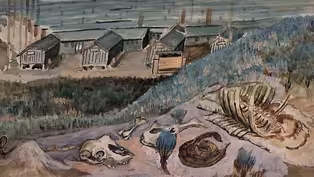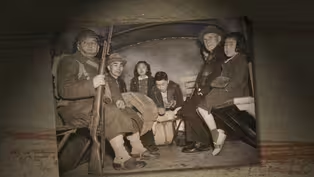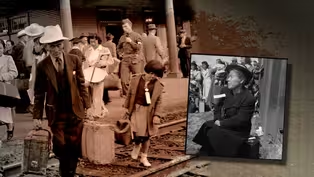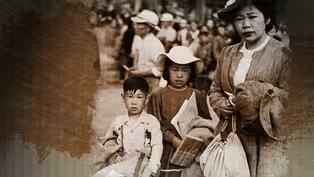Injustice at Home
Never Again
Season 3 Episode 5 | 5m 6sVideo has Closed Captions
Douglas Heyamoto learned from his parent’s experience.
Like most Japanese Americans after the war, the Heyamoto’s just wanted to get on with their lives, pick up the pieces and forget what had happened. But finding housing and a good paying job were practically impossible after the war if you were Japanese American. Douglas Heyamoto learned from his parent’s experience, gaining more of a sense of proactivity, to stop injustice from happening again.
Problems playing video? | Closed Captioning Feedback
Problems playing video? | Closed Captioning Feedback
Injustice at Home is a local public television program presented by KSPS PBS
Funded by the Kip Tokuda Memorial Washington Civil Liberties Public Education Program, Washington State Office of the Superintendent of Public Instruction. Copyright 2018, Friends of KSPS, Spokane.
Injustice at Home
Never Again
Season 3 Episode 5 | 5m 6sVideo has Closed Captions
Like most Japanese Americans after the war, the Heyamoto’s just wanted to get on with their lives, pick up the pieces and forget what had happened. But finding housing and a good paying job were practically impossible after the war if you were Japanese American. Douglas Heyamoto learned from his parent’s experience, gaining more of a sense of proactivity, to stop injustice from happening again.
Problems playing video? | Closed Captioning Feedback
How to Watch Injustice at Home
Injustice at Home is available to stream on pbs.org and the free PBS App, available on iPhone, Apple TV, Android TV, Android smartphones, Amazon Fire TV, Amazon Fire Tablet, Roku, Samsung Smart TV, and Vizio.
Providing Support for PBS.org
Learn Moreabout PBS online sponsorshipMore from This Collection
A study of the resettlement of Japanese Americans after WWII and the ongoing hardships and discrimination they experienced in the postwar years.
Video has Closed Captions
Takuichi Fujii used art to captured his experiences in Japanese American internment camps. (7m 35s)
We Only Took What We Could Carry
Video has Closed Captions
Japanese living on west coast forced to leave their homes with only what they could carry (8m)
Video has Closed Captions
Japanese Americans lost freedom, possessions, privacy and dignity when forced into camps. (6m 36s)
Video has Closed Captions
"Shikata ga nai, you can’t help this, you can’t change this, so make the best of it." (6m 4s)
Video has Closed Captions
Incarceration camps closed, most Japanese Americans were not welcome to return home. (5m 29s)
Providing Support for PBS.org
Learn Moreabout PBS online sponsorship(soft whimsical music) (clicking) (singing in foreign language) - [Narrator] In the late 1940s, Doug Heyamoto grew up living at the Globe Hotel on skid row in downtown Spokane.
His parents, George and Fumiko Heyamoto were the managers there.
- [Doug] At the Globe Hotel, there were no parks.
The alleys were our playground.
- [Narrator] The Globe, like other hotels on skid row, became the first stop for many of the newly freed Japanese American families coming to Spokane from the incarceration camps.
- There were many people who wanted to find temporary housing until they figured out where they wanted to lead their lives and the Globe Hotel seemed like the logical place.
- [Narrator] Heyamoto's parents were also incarceration camp survivors.
They met in Spokane after their families were released from Tule Lake and Heart Mountain.
- [Doug] They met in Spokane when both the Fukai family and the Heyamoto family relocated from their respective internment camps.
- [Narrator] Like most Japanese Americans after the war, the Heyamoto's just wanted to get on with their lives, pick up the pieces and forget what had happened.
But finding housing and a good paying job were practically impossible.
- If you didn't know anybody to move in with after the war, your housing options were very limited, because this was a period of time when housing discrimination was still in effect.
(soft music) - [Narrator] Many highly educated Japanese Americans would end up working low level, low paying jobs to make ends meet.
- [Doug] No matter where you went, there was still discrimination and bias.
- [Narrator] Discrimination and hostility toward the Japanese Americans had increased after the war.
To get around these limitations, the Japanese Americans worked very hard to establish themselves in their new community.
It was not uncommon to work two or three jobs to get ahead.
If no one would hire them, they'd start their own business.
- My mother had five brothers.
And they were all quite entrepreneurish.
And so, they very quickly started a vegetable farm, a auto repair business.
- But all the rest of my uncles, they had a main occupation whether it was farming.
They also worked for the railroad and most of them did some gardening on the side too.
Like, three jobs all at the same time.
- The Japanese community at that time liked to do business with other Japanese.
Our insurance agent was Harry Honda, and I had a Japanese dentist.
- [Doug] They made great opportunities for themselves.
There were fabulous doctors.
There were dentists, they were pharmacists.
And so there was a lot of success stories.
I'm sure that was not easy for any of them.
(singing in foreign language) - [Narrator] We must never forget is the message Douglas Heyamoto learned from his parent's experience.
- We learned from what happened to the Issei and our parents, and I at least personally have gained more of a sense of proactivity looking at human rights.
What is the right thing to do, what is the wrong thing to do?
- [Doug] We don't understand in the United States, that what happened to the Japanese Americans could happen again, and might happen again.
(soft educational music)
Support for PBS provided by:
Injustice at Home is a local public television program presented by KSPS PBS
Funded by the Kip Tokuda Memorial Washington Civil Liberties Public Education Program, Washington State Office of the Superintendent of Public Instruction. Copyright 2018, Friends of KSPS, Spokane.




















